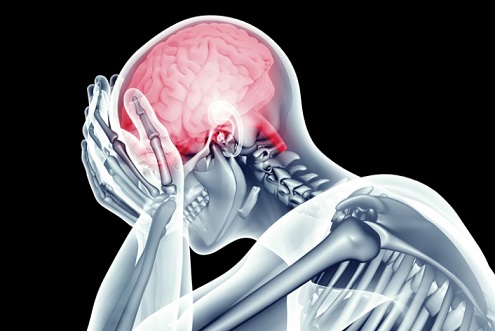Nikhil Prasad Fact checked by:Thailand Medical News Team Jul 12, 2024 9 months, 2 weeks, 17 hours, 32 minutes ago
COVID-19 News: The COVID-19 pandemic, known for its devastating respiratory effects, has been linked to a variety of neurological complications. Recent research now highlights cerebellitis, a condition characterized by inflammation of the cerebellum, as a potential consequence of COVID-19 infection, particularly affecting males. This
COVID-19 News report delves into these study findings and their implications.
 COVID-19 can cause Cerebellitis especially in males
What is Cerebellitis?
COVID-19 can cause Cerebellitis especially in males
What is Cerebellitis?
Cerebellitis involves inflammation of the cerebellum, the part of the brain that regulates coordination and balance. It can manifest suddenly, causing symptoms such as unsteady gait, dizziness, headaches, and sometimes more severe neurological deficits. The condition can be triggered by infections, including viral infections like COVID-19.
The Study and Its Findings
A comprehensive study conducted by Dr Soroush Najdaghi, Dr Delaram Narimani Davani, Dr Mohammadreza Hashemian, and Dr Narges Ebrahimi from Isfahan University of Medical Sciences and Ahvaz Jundishapur University of Medical Sciences in Iran, sought to investigate the incidence and characteristics of cerebellitis following COVID-19 infection.
The researchers analyzed 18 cases from nine countries, with the highest number of cases reported in the USA. Interestingly, 94.4% of these cases involved males, with an average age of 40.1 years. This male predominance suggests a potential gender-linked susceptibility to post-COVID cerebellitis.
Symptoms and Diagnosis
Patients typically exhibited symptoms such as confusion, altered mental status, ataxia (lack of muscle coordination), and severe headaches. These neurological symptoms generally appeared about 15 days after the initial COVID-19 infection. Diagnostic methods included nasopharyngeal swabs for COVID-19 detection and brain MRI scans, which revealed cerebellar inflammation in most cases.
Underlying Conditions and Biomarkers
The study found that common underlying conditions among these patients included hypertension and diabetes. Blood and cerebrospinal fluid (CSF) analyses were performed, showing elevated levels of certain proteins indicative of blood-brain barrier disruption and inflammation. However, direct detection of the virus in the CSF was rare, suggesting that the neurological symptoms were more likely due to immune response rather than direct viral invasion.
Treatment Approaches
Treatment varied depending on the severity of the symptoms and underlying conditions. Most patients received a combination of antiviral medications and steroids. This approach was generally effective, with many patients achieving complete recovery. In some severe cases, immunotherapy using intravenous immunoglobulin (IVIg) was employed, showing positive outcomes.
One notable case involved a patient with a history of cardiac surgery who developed severe cerebellitis after COVID-19 infection. Despite initial t
reatments, the patient required plasmapheresis, a procedure to remove harmful antibodies from the blood, which ultimately led to significant improvement.
Implications and Future Directions
This study underscores the importance of considering cerebellitis as a possible complication of COVID-19, especially in males. The findings highlight the need for heightened awareness and early diagnostic measures to manage and treat this condition effectively.
The researchers advocate for a multidisciplinary approach to treatment, incorporating neurologists, infectious disease specialists, and immunologists to tailor treatment plans for affected patients. They also emphasize the necessity for further research to understand the mechanisms underlying this gender disparity and to develop targeted therapies.
Conclusion
The revelation that COVID-19 can lead to cerebellitis, particularly in males, adds another layer to the complex aftermath of this virus. While the exact reasons for this gender-specific impact remain unclear, the study provides crucial insights into the neurological risks associated with COVID-19 and underscores the importance of comprehensive medical care for those affected.
The study findings were published in the peer-reviewed journal: Heliyon.
https://www.sciencedirect.com/science/article/pii/S2405844024105282
For the latest
COVID-19 News, keep on logging to
Thailand Medical News.
Read Also:
https://www.thailandmedical.news/news/breaking-evidence-found-that-sars-cov-2-even-delves-into-the-skull-bones-of-those-infected
https://www.thailandmedical.news/news/covid-19-causes-glymphatic-drainage-dysfunction-and-bbb-disruption-that-contributes-to-neuroaxonal-injury
